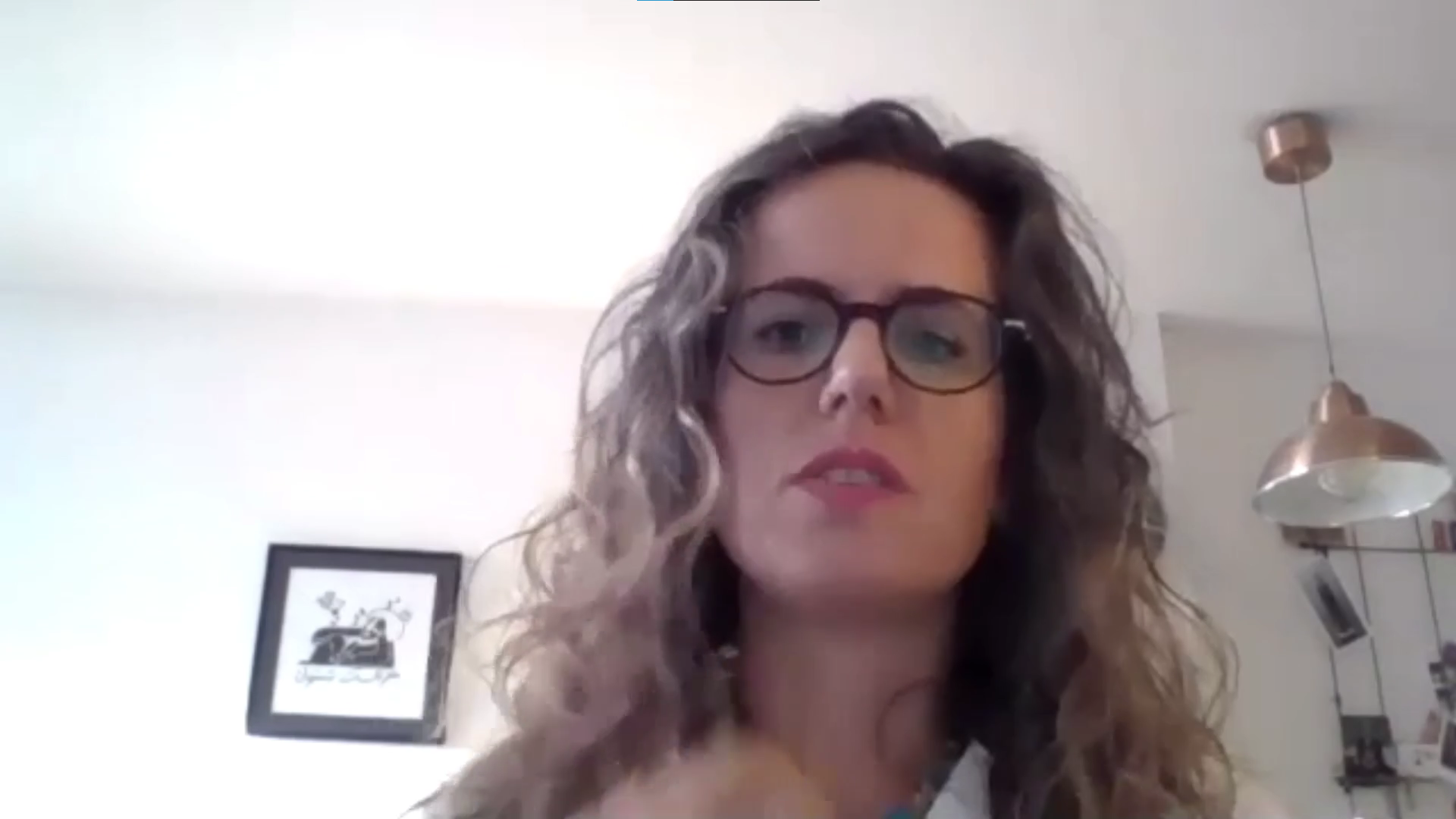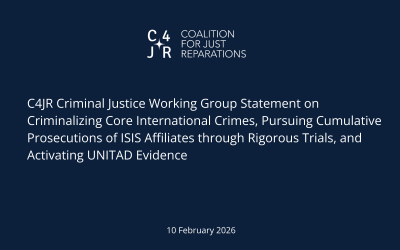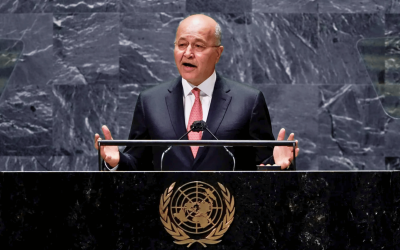Nita Gojani is a transitional justice expert who has worked on designing and implementing reparations programs for conflict-related sexual violence in Kosovo and Croatia. For nearly ten years she has worked on the implementation of the UN Women, Peace and Security agenda. Ms. Gojani has been deployed by the Justice Rapid Response to support the Coalition for Just Reparations in Iraq.
Vina: Nita, you, among other things, oversaw the design and advocacy for a reparations program for survivors of conflict-related sexual and gender based violence in Kosovo. You were involved in consultations with survivors, in development of an action plan for enhancing their access to justice; developing a transitional justice strategy for Kosovo through public consultations etc. So, first of all thank you and Justice Rapid Response for helping us out and agreeing to this interview. Can you please introduce yourself in your own words and please add something I have surely missed to say about your remarkable career.
Nita: Thank you for the generous presentation Vina. I think you covered quite a lot of it. As you said, I am a transitional justice expert deployed by the Justice Rapid Response to support the Coalition for Just Reparations in Iraq. I have been working on issues related to women peace and security for almost 10 years and specifically the transitional justice. In the last years I have been working on children´s rights as well. I am originally from Kosovo, currently based in Oslo.
Vina: What’s your impression working with NGO’s in Iraq on the topic of reparations?
Nita: One thing that comes out very clearly is the fact that it is a very broad coalition that has come together and they’re obviously doing a lot of joint work. I think it enhances the voice of the NGOs that are part of the coalition. And another striking feature is the fact that of just how inclusive the view towards reparations is in the coalition both in terms of forms of reparations that the individuals have right to but more important thing is the fact that it’s a very inclusive view towards making sure that all groups that were affected during the ISIS conflict get access to reparations irrespective of what ethnic group they might belong to and that it is very much a way of making sure that all the genders are involved and have access to reparations as well.
Vina: C4JR has produced a Draft Law on Reparations for Survivors of Conflict Related Sexual Violence Committed During the ISIS Conflict in Iraq. What can C4JR do to ensure this draft law is placed on the agenda of relevant stakeholders in Iraq?
Nita: The draft law you mentioned from the coalition is a very strong start. It is quite inclusive and it makes sure that reparations for conflict-related sexual violence are something that all genders have access to and everybody who has been affected by it; no matter what ethnic group they belong to. And it mentions all forms of all different kinds of reparations as well. I think it is important to continue engaging in advocacy and continue to involve other stakeholders as well, possibly other NGOs that might not be part of the coalition. I know the coalition is doing quite a lot work of engaging with survivors as well; making sure that their voices are being heard and I think it’s important to continue that. While the coalition does not speak on behalf of the survivors it is important to continue making sure that the survivors’ voices are heard and that the coalition can provide a platform for that whenever possible.
Nita: Yes, as you’ve mentioned I’ve been working with the working group during the summer months. The policy paper is supposed to be a sort of a road map or an implementation tool as to how the draft law of the coalition could be implemented. It goes through providing different steps that would need to be taken to ensure that the law is implemented following best international standards and practices. And it also, the policy paper itself, gives a few steps as to what the coalition could do in the future and what are the next steps that could be taken both to pass the draft law and also to ensure that legislative framework is fully completed.
Vina: You have experience with working on reparations for conflict-related sexual violence from others part of the world, most notably Kosovo and Croatia. Based on this, what would be the lessons learned for Iraqi civil society working on reparations claims, what should be embraced and what avoided?
Nita: I have been working quite a lot on Kosovo. I think Croatia we’ve mentioned – we’ve learned from the practice in Croatia because Kosovo and Croatia are two countries that currently have reparation systems set up to provide reparations for conflict-related sexual violence survivors. Based on that, the lessons learned for Iraqi society would be to ensure that everybody’s expectations are managed and that they are aware of what the law could possibly do and what the realistic timelines would be. Most of these laws take a really long time until they’re set in place, both Kosovo and Croatia have only recently set up reparations systems but the atrocities there have happened twenty and more than twenty years ago. So it can, and usually does, take a long time and it is important to have strong political will and have almost like an alignment. All the stars need to be aligned as they say. So it’s a lot of different factors that need to be in place, and I think that getting NGOs support and making sure that there is strong pressure from civil society and strong pressure from survivors especially is very important to push things forward. It is also important to remember that you could have a perfect law but if it is not implemented it doesn’t really make much sense. So, it is important to make sure that any legislative framework that is put in place could realistically be implemented and [that] there is enough being done to ensure that there is capacity within Iraq to implement that law. While I know that the coalition has taken quite a maximal approach, and I think rightly so, towards the law, making sure that the draft law being suggested is based on best practices and international standards would be the best possible approach. It is, however, important to keep in mind that there should be some realism involved as well and it should be balanced. Maximum support should be balanced with being realistic towards providing a path for implementation and ensuring that survivors have access to the just reparations they deserve.
Vina: How can reparative justice processes serve women in Iraq more effectively? Also, how could one integrate a gender perspective into Iraqi civil society efforts to promote reparations?
Nita: So, just to clarify that the draft law the working group has been dealing with was focusing very much on conflict-related sexual violence and that is not something that affects women only. It is definitely one way towards ensuring that there is a strong gender-perspective as conflict-related sexual violence is very much a form of gender-based violence. It can, however, affect all genders. So, both men and women can be survivors of sexual violence, and it is important that that gets acknowledged, as the draft law rightly so does. And that both men and women would have access to reparations if they have survived conflict-related sexual violence. One of the ways [of integrating a gender perspective into efforts to promote reparations], that the coalition has been doing, is to ensure that the women’s organizations are involved. These organizations, that work directly on women’s rights, are prominent in the work of the coalition. It is thus important to ensure that women’s voices are heard. Not just when we’re talking about sexual violence but when we’re talking about all transitional justice processes, it is important to make sure that women are being consulted throughout the process. These consultations might sometimes need to take a slightly different turn – either be happening at a different time or taking a different form – to ensure that the women are feeling safe to raise their concerns and to raise their voices. It’s important that the NGOs make sure that these voices are amplified and heard in all public processes around reparations and all the other transitional justices. It is, of course, [paramount to] make sure that women´s voices are [not only formally] heard, but trying to advocate to ensure that women are being [truly] heard as well, which would mean that women are at the center of decision-making as well. Not just consulted at the end but that they are a part of the whole process.
Vina: What is necessary to ensure reparations for survivors of sexual conflict come to fruition?
Nita: I think I’ve already touched on some of the things but, it is very important to ensure that there is a real commitment from the government. Which would be both in terms of political will, but then also in terms of putting aside budget and other resources to ensure that the law, that any sort of legislative framework, gets implemented. It is very important to continue making sure that the survivors voices are heard and that includes having consultations and engagements with survivors so that they’re involved. Not just in setting up the legislative framework but also later on in how the system gets implemented. Also, it is important to learn from the past and that’s not just lessons from other countries but also includes learning from how reparation systems, reparations schemes, have been implemented in Iraq before and I’m mainly referring to the current and past implementation of Law 20 in Iraq. So it’s important to learn from that and see what can be taken forward and what can be improved.
Nita: It’s important to continue advocacy. It would be important for the coalition to continue mapping out who should be targeted with this advocacy and who are main stakeholders and of course it should always include survivors as well. It is very important to get the survivors buy-in so that they can trust the system; so that they trust the process of how the system is set-up. That will ensure that they trust the system when it is being implemented as well. It is important to continue fighting stigma around sexual-violence. In all societies, all around the world, victims of any form of sexual violence, especially conflict-related sexual violence can face quite a lot of stigma. So it is important to keep on fighting it and this is where NGOs can play a very big role. That would ensure that survivors are accepted in their community and continue to be accepted. It will also make it easier for survivors to come forward once the law is implemented and to demand reparations they are entitled to. I think the coalition is good in making it clear that they are not speaking on behalf of survivors, but they should continue being a platform where the survivors’ voices can be heard and where survivors’ voices can be lifted up. And it is important to continue sharing experiences among the NGOs. The coalition is quite a broad coalition of NGOs that bring with themselves different experiences. Experiences with different groups, and experiences in provision of different services and in different types of work, so it is important to continue learning from each other. And that could be also in the form of developing maybe guidelines on how [to provide services] so that there is a bit more uniformity and to ensure that survivors receive the same standard of service no matter what NGO they are seeking that service from. Maybe one last thing would be to continue engagement with all stakeholders: both in development of guidelines and development of the framework, to make sure that it’s not [only] NGOs talking to each other. That the survivors are being heard. That the general public is being made aware. And, of course, that there is a lot of work together with the government, who would be the main duty bearer. And then also with international community as well which can provide sometimes not just pressure, but could provide also some support in development of the framework and then later the implementation as well.
Nita: I think the two are definitely not mutually exclusive. I think we have seen, in Iraq as well, a lot of human rights activists who are women and who are very successful in their careers and have achieved a lot. Speaking from personal experience and from others, it is important not to lose enthusiasm. I think work in human rights in general, and especially as a human rights activist, can often be a bit disappointing because it takes a long time to see change. So, it is important to keep the spirits up, which would mean that we should learn from when something doesn’t work out, or from mistakes or from loses. We should learn from them but not let them bring us down and instead keep on fighting. Also, have rejoice in every win no matter how small it is. It is important to keep the sprits up. Take every chance whenever it comes. Chances can take different forms and sometimes it can seem quite daunting or feel like it’s a big risk, but it’s important to take these chances throughout life. That includes being curious. Making sure that you are always inquisitive and willing to keep on learning new things. Personally, for me it has always been helpful to find a mentor. Somebody you can look up to. Somebody that can guide you, that you can talk to both in terms of any sort of challenges you might face in your career or to provide you that extra support needed.
Interview conducted by the C4JR PR Officer Ms. Vina Yaqoob Yousif



